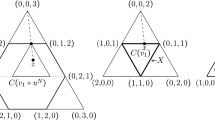Abstract
We give an axiomatization of the aspiration core on the domain of all TU-games using a relaxed feasibility condition, non-emptiness, individual rationality, and generalized versions of the reduced game property (consistency) and superadditivity. Our axioms also characterize the C-core (Guesnerie and Oddou, Econ Lett 3(4):301–306, 1979; Sun et al. J Math Econ 44(7–8):853–860, 2008) and the core on appropriate subdomains. The main result of the paper generalizes Peleg’s (J Math Econ 14(2):203–214, 1985) core axiomatization to the entire family of TU-games.
Similar content being viewed by others
References
Albers W (1979) Core-and kernel-variants based on imputations and demand profiles. In: Moeschlin O, Pollaschke D (eds) Game theory and related fields. North-Holland, Amsterdam
Aumann RJ (1985) An axiomatization of the non-transferable utility value. Econometrica 53: 599–612
Bennett E (1981) The aspiration core, bargaining set, kernel and nucleolus. Technical report, working paper 488, School of Management, State University of New York at Buffalo (revised 1983)
Bennett E (1983) The aspiration approach to predicting coalition formation and payoff distribution in sidepayment games. Int J Game Theory 12(1): 1–28
Bondareva O (1963) Some applications of linear programming methods to the theory of cooperative games. SIAM J Probl Kibernetiki 10: 119–139
Cross JG (1967) Some theoretic characteristics of economic and political coalitions. J Confl Resolut 11: 184–195
Davis M, Maschler M (1965) The kernel of a cooperative game. Nav Res Logist Quart 12(3): 223–259
Gillies DB (1959) Solutions to general non-zero-sum games. Contributions Theory Games 4: 47–85
Guesnerie R, Oddou C (1979) On economic games which are not necessarily superadditive: solution concepts and application to a local public good problem with few a agents. Econ Lett 3(4): 301–306
Hart S (1985) An axiomatization of Harsanyi’s nontransferable utility solution. Econometrica 53:1295– 1313
Hokari T, Kibris Ö (2003) Consistency, converse consistency, and aspirations in tu-games. Math Soc Sci 45(3): 313–331
Hwang YA, Sudhölter P (2001) Axiomatizations of the core on the universal domain and other natural domains. Int J Game Theory 29(4): 597–623
Keiding H (1986) An axiomatization of the core of a cooperative game. Econ Lett 20(2):111–115
Keiding H (2006) An axiomatization of the aspiration core. Game Theory Math Econ 71:195–204
Moldovanu B, Winter E (1994) Consistent demands for coalition formation. In: Megiddo N (ed) Essays in game theory in honor of Michael Maschler. Springer, New York, pp 129–140
Orshan G, Sudhölter P (2010) The positive core of a cooperative game. Int J Game Theory 39(1): 113–136
Peleg B (1985) An axiomatization of the core of cooperative games without side payments. J Math Econ 14(2): 203–214
Peleg B (1986) On the reduced game property and its converse. Int J Game Theory 15(3): 187–200
Peleg B (1989) An axiomatization of the core of market games. Math Oper Res 14(3): 448–456
Schmeidler D (1969) The nucleolus of a characteristic function game. SIAM J Appl Math 17(6): 1163–1170
Serrano R, Volij O (1998) Axiomatizations of neoclassical concepts for economies. J Math Econ 30: 87–108
Shapley LS (1953) A value for n-person games. contributions to the theory of games. In Annals of mathematics studies, vol 2. Princeton University Press, Princeton, pp 307–317
Shapley LS (1967) On balanced sets and cores. Nav Res Logist Quart 14(4): 453–460
Sharkey WW (1993) A characterization of some aspiration solutions with an application to spatial games. Working paper 95, Bell Communications-Economic Research Group
Sun N, Trockel W, Yang Z (2008) Competitive outcomes and endogenous coalition formation in an n-person game. J Math Econ 44(7–8): 853–860
Tadenuma K (1992) Reduced games, consistency, and the core. Int J Game Theory 20(4): 325–334
Voorneveld M, Van Den Nouweland A (1998) A new axiomatization of the core of games with transferable utility. Econ Lett 60(2): 151–155
Author information
Authors and Affiliations
Corresponding author
Rights and permissions
About this article
Cite this article
Bejan, C., Gómez, J.C. Axiomatizing core extensions. Int J Game Theory 41, 885–898 (2012). https://doi.org/10.1007/s00182-011-0316-4
Accepted:
Published:
Issue Date:
DOI: https://doi.org/10.1007/s00182-011-0316-4



